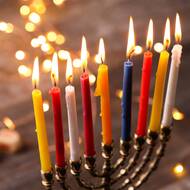Dear JCOGS family,
Many of us woke early to watch the news of homecoming. On the eve of Simchat Torah in Israel, exactly two years since the nightmare began, the hostages have come home. Words cannot contain the relief, the gratitude, the tears that flow as we witness what we have prayed for without ceasing. Families are reunited. Children are held once again. Faces that lived only in our prayers now stand before us, fragile, traumatized, but home. Millions of Israelis gather in the streets. This is pure celebration. Thank G-d.
Dani Wassner in the Israel office of Jewish Federations of North America wrote: “We can indeed feel the weight of history today, and the unbridled joy of the moment. At the same time, we have heavy hearts for all the tragedy and everything that has been lost, alongside genuine concern for what the future may hold.”
As I said yesterday at the gathering in Burlington, this is a moment of complex hope, a time when joy and heartbreak, celebration and devastation live side by side.
We read the book of Ecclesiastes on Sukkot: “For everything there is a season, and a time for every purpose under heaven: a time to weep and a time to laugh, a time to mourn and a time to dance.” Israeli poet Yehudah Amichai reminds us: “A man needs to laugh and cry with the same eyes.” Rachel Goldberg-Polin, mother of murdered hostage Hersh, said: “There is a time to sob and there is a time to dance, and we have to do both right now.” We now laugh and cry with the same eyes, dance and grieve with the same heart—mourning and celebration bound together.
We have fervently prayed for this day to arrive. We have prayed for the hostages in the tunnels, in fear and in isolation, for their families whose 738 days of waiting felt endless, and for all Israelis and Jews around the world. Yet not all have come home alive, and not all of those murdered have come home.
We too have prayed for the people of Gaza, for families caught in suffering, for children who have lost their homes and hope, for food, medicine, and safety to reach them. Yet, even with their celebration in the streets for the ceasefire, they live amidst the rubble and immense loss.
Even in our joy, we know that pain remains close. The wounds are deep, both seen and unseen.
This week we learned of Roei Shalev, a survivor of October 7 who saw his girlfriend murdered before his eyes at the Nova Music Festival. His mother took her own life two weeks later. On Friday, Roei’s body was found. He had taken his own life. He wrote, “I just want this suffering to end.”
Roei’s words echo through this moment. We all want this suffering to end. His story reminds us that healing will take time.
All as one, may this be a time of comfort for mourners and joy for those who have waited. May this herald a new era, that we shall not ever again live through a time like this. And through G-d and our own deeds, let this mark the end of captivity and the beginning of relief and reconciliation, a step toward a future where Israelis and Palestinians live in safety, dignity, and peace.
In abundant gratitude for the return of the captives, in this time of celebration, with prayers for healing for the road ahead in this tender season. Chag sameach,
Rabbi David
P.S. Please join us this Friday at JCOGS. We will begin with a Yizkor Memorial Service at 5:30 p.m., holding space for loss and grief, and then move into Simchat Torah at 6:00 p.m., lifting our hearts together in song, dance, and gratitude. Every year, this is an incredible poignant ritual as we unroll the whole Torah. All the more so, this year.















































































